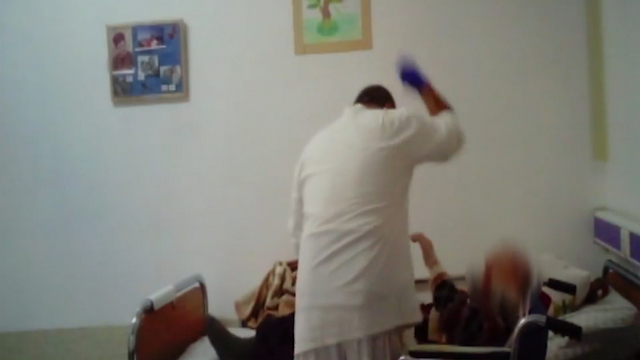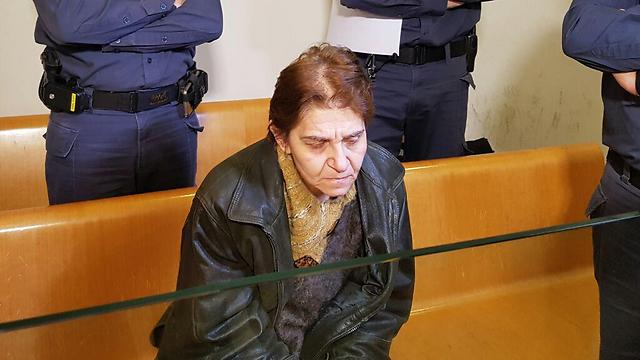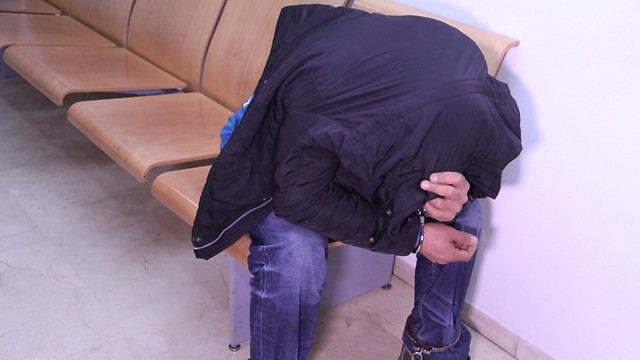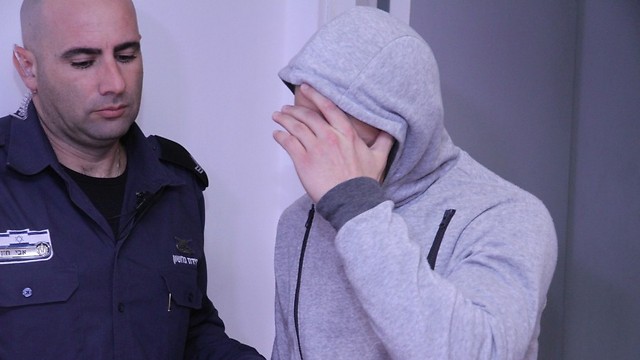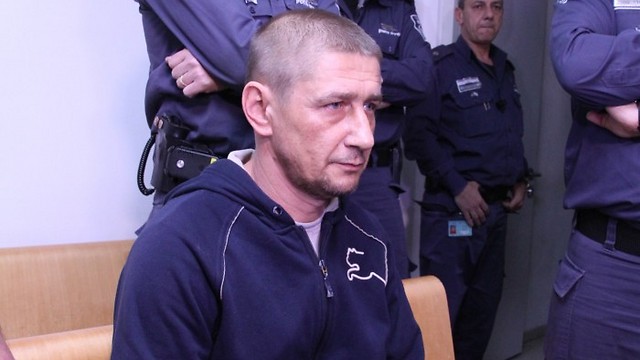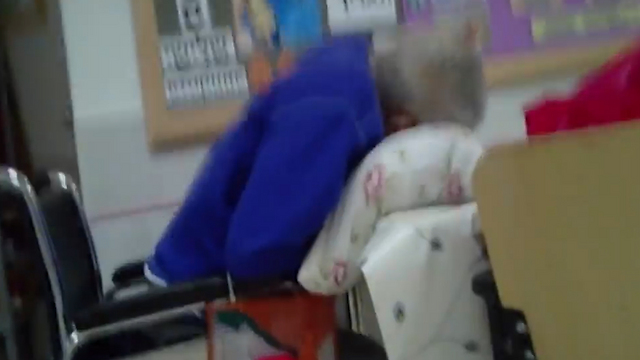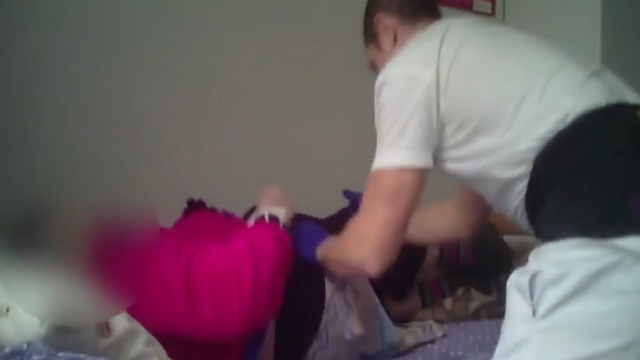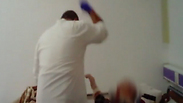
Four nursing home employees suspected of abuse indicted
After disturbing footage brings to light abuse of elderly patients, three caregivers and nurse are charged with abuse, assault and neglect; indictment reveals harrowing new details of the negligence and violence at a Haifa nursing home.
Three caregivers and a nurse, who were arrested last month for abuse and neglect of the elderly at the Naiot Kipat Hazahav nursing home in Haifa, were indicted on Sunday.
The caregivers—Husam Abu Ahmad, Andrei Keis and Peter Goskov—and the nurse in charge of the ward, Inessa Schneider, were all charged with abusing a helpless person in their care. The caregivers were also charged with aggravated assault, while the nurse is charged with failing to report abuse.
The indictment describes numerous counts of abuse at the Haifa nursing home, including hitting, cursing and humiliating the patients.
Nurse Schneider was charged with that offense as well, as it was done in accordance to her instructions and with her knowledge
In another incident, caregivers tied a man in his eighties to his bed in spread-eagle fashion, with each hand tied to the bedrail, and sometimes each leg as well. The man spent long hours tied in this fashion, sometimes entire nights.
Schneider, who was the nurse in charge of the ward for nine years, ordered another patient similarly tied to his bed for long periods every day for about six weeks, according to the indictment. In addition, it said, she ignored complaints about the caregivers' abuse by both patients’ relatives and other employees, declining to either report or investigate the allegations.
In one case, Abu Ahmad entered a room in the middle of the night and changed an elderly woman’s diaper and clothes in a violent fashion, shaking her from side to side as she wailed, all without saying a word to her. He then pulled her by the arm and head to transfer her to a wheelchair. Finally, he turned off the light and left her in her wheelchair in the dark for three and half hours.
In another case, Abu Ahmad placed his knee on an elderly woman’s stomach and left arm, putting all his weight on it while he changed her clothes, ignoring her sobs and screams. In yet another, he hit a patient in the stomach and back 10 times with his hand and elbow, then grabbed her head, moved her to a wheelchair and slapped her on the cheek twice.
Against Goskov, the indictment charges that he used to beat patients while transferring them from their bed to a chair and vice versa. In one incident, Goskov washed a heavy-set woman while she was strapped to a harness, after which he didn’t dry her off and instead left her to dry in the harness, shivering from the cold.
The indictment also describes how an 86-year-old man asked another cairgiver, Keis, to take him to the bathroom. “We have no bathroom here, just a floor,” Keis responded, and repeated this over and over as the man begged to be taken to the bathroom. The caregiver ordered him to go in his diaper. Keis also told the patient, “To me you’re just a man, a worthless man.” He then waved a threatening fist at the old man’s face.
In a similar incident, Keis punched another patient in the face until he bled and had to receive treatment at a hospital.
In another incident, Keis harassed a patient while he was eating, pulling his hat down on his face. When the elderly man started crying and yelling at him, Keis threatened him that for any word he says about it he will be hit again, saying to him "if you visit a social worker tomorrow, the day after that I'll come at night and f*** you up."
In still another incident, after drinking on the job, he threatened to cut a patient's ears, hands and eyes if she does not shut up.
When a daughter of one of the patients complained to Schneider about Keis's abuse of her father and his drinking, Schneider responded that "if she does not like it, she should take her father out of here."
'What about the others, who knew but kept silent?'
Daniel, the son of one of the elderly women allegedly abused, says that since these incidents came to light, he arrives daily at the nursing home and closely examines how his 88-year-old mother is being treated."They notified me about the abuse only after it was made public, and when they knew I was on my way to the home they called to let me know that she was hit in the head and has swelling, telling me not to be alarmed," Daniel said.
"The fact this wasn't reported can't just be put on one nurse," he added. "What about all the other doctors and nurses who knew but kept silent?"
Daniel had considered transferring his mother to a different nursing home, but decided against it since the conditions in Naiot Kipat Hazahav have improved dramatically since the abuse came to light. "I wish it was like this from the start," he bemoaned.
Schneider's lawyer repeated Daniel's questions, asking "If my client is accused of failure to report, then what about the other nurses, doctors, and other authorities? What about the other nurse who was arrested but released with no charges? It can't be that my client knew, which she denies, and no one else did, or was even questioned."
Pictures and video of the abuse at Haifa's Naiot Kipat Hazahav nursing home were broadcast in February following an investigative series of articles published in Yedioth Ahronoth, in which journalist Ariela Sternbach documented severe instances of violence, abuse and humiliation at nursing homes. The articles caused a major uproar and have sparked a crisis in the nursing care industry.
After the issue came to light, it prompted many to act, including government officials.
MK Itzik Shmuli (Zionist Union) is in the process of proposing legislation requiring video cameras to be placed in all nursing homes for the protection of the residents therein.
Minister of Health Yaakov Litzman (United Torah Judaism) sent a letter to Prime Minister Benjamin Netanyahu and Minister of Finance Moshe Kahlon (Kulanu), demanding additional personnel to counter the work load, and namely foreign labor, calling this a "public crisis."
The cost of these additional workers is estimated to be over NIS 80 million per year. In addition, work permits for 2,400 foreign workers would need to be issued.
The nursing home stated that "the findings displayed in the report and difficult and depressing. After the situation was brought to our attention, we filed a complaint against the aforementioned employees with the police, and have taken the necessary disciplinary steps.
"We have no intention to just deal with this and move on, and so have established a special committee to prevent recurrence. In addition, we have requested the Ministry of Health to conduct its own independent examination."











